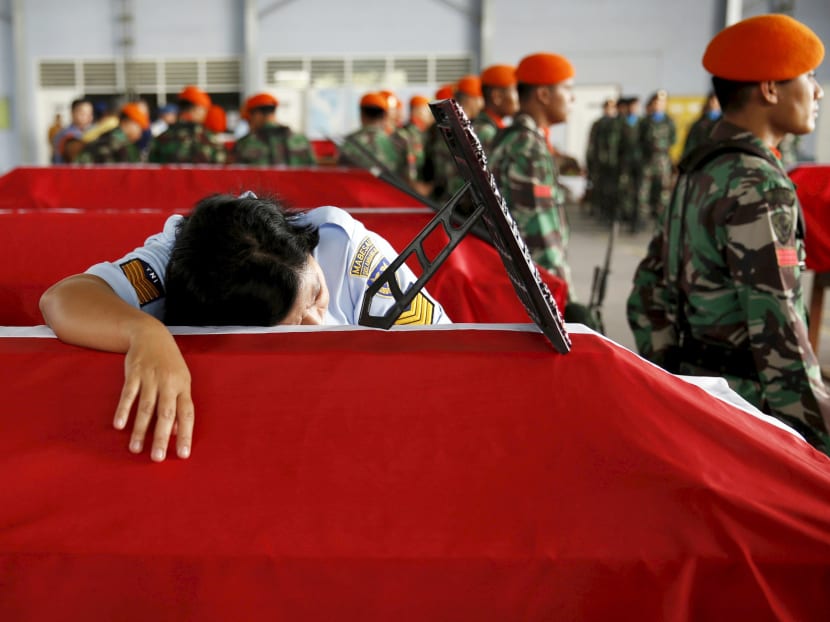Medan crash: Plane might have carried paying passengers
JAKARTA — The number of fatalities in Tuesday’s air crash in Medan, where an Indonesian military transport plane crashed into a residential area, has risen to 141 amid controversy that the C-130 Hercules might have been carrying paying passengers.

Swet Eka, an Indonesian soldier, mourns on the coffin of her husband (also a soldier), one of the victims in an Indonesian military C-130 Hercules transport plane that crashed into a residential area, inside military airbase in Medan, Indonesia North Sumatra province July 1, 2015. Photo: Reuters
JAKARTA — The number of fatalities in Tuesday’s air crash in Medan, where an Indonesian military transport plane crashed into a residential area, has risen to 141 amid controversy that the C-130 Hercules might have been carrying paying passengers.
Vice-President Jusuf Kalla has, however, justified the alleged use of the military plane for the commercial transportation of civilians, saying this was a valuable contribution to isolated communities from the Indonesian armed forces, or TNI.
“The military has civilian missions as well (as military ones),” he said, adding that the C-130 transporter that crashed on Tuesday shortly after take-off was “not on any special mission”.
“So rather than fly empty to Natuna, it took on passengers. I see that as a contribution by the TNI to people in difficult circumstances,” Mr Kalla told reporters in Jakarta.
The plane was officially on a mission carrying supplies to a naval base in the Natuna Islands, at the south-western tip of the South China Sea. Before that, it had travelled from the capital, Jakarta, and landed at two locations before stopping over at Medan’s Soewondo Air Base on Sumatra, one of Indonesia’s main islands.
Rated to transport a total number of 97 passengers and crew, it was officially listed as carrying 12 crew and 101 passengers, ostensibly military personnel and their families being stationed in the Natuna Islands, on the ill-fated leg.
However, the number of casualties and a preliminary investigation indicate that the 51-year-old plane was likely carrying more than 120 people and that some of those on board were likely civilian passengers paying for a ride to the remote island chain.
Defence Minister Ryamizard Ryacudu, a former Army chief of staff, acknowledged that transporting civilians on military aircraft was a common practice in Indonesia, a sprawling archipelago that spans three time zones. “It’s been like that since way back,” he said. “If they want to go along, they’re welcome to. It’s been like that for ages, with no problems before.”
The statements from the defence minister and the vice president fly in the face of the Air Force’s own policy of not allowing civilians onto military aircraft outside of emergency situations.
“No (military) aircraft is permitted to transport civilians,” Air Marshal Agus Supriatna said on Tuesday, “unless there are orders from above, for instance for evacuation in the case of a disaster. Family members (of military personnel) are an exception.”
He stressed that the “commercialisation” of military flights was strictly prohibited. “If that was the case (in the Medan accident), we’ll fire the commander,” Mr Agus said. “This is definitely one aspect of our ongoing investigation.”
Although the plane was carrying more passengers than allowed, Mr Agus denied claims that the plane was overloaded, saying it would not have been cleared for take-off if it was.
The death toll includes all the people on the plane, as well as at least 19 people on the ground. The cause of the accident is not yet known but the pilot was trying to return to the airport because of an engine problem.
Interviewed at Adam Malik Hospital, where the bodies were taken to, Mr Indra Bakara said his cousin was one of the civilians on the flight and paid about 1 million rupiah (S$101) to go to Natuna. As he spoke, the dead woman’s mother, Ms Nacita Batubara, wept and shouted her daughter’s name, wailing that she had driven her to catch the plane.
“Lack of transportation to Natuna has forced us to go there by military flight, no choice,” Mr Bakara said.
Dozens of family members gathered at Adam Malik Hospital yesterday. Outside its mortuary, more than 100 wood coffins were arranged in rows and women cried and screamed the names of loved ones killed in the disaster. A group of students from a Catholic high school in the city screamed hysterically as a body bag was opened, revealing the badly bruised corpse of classmate Esther Lina Josephine, 17, clasping her 14-year-old sister.
“She looks like she wanted to protect her younger sister,” said the school’s principal, Tarcisia Hermas. “We’ve lost kind and smart students who had so many creative ideas.”
Indonesia has a patchy civil aviation safety record and its cash-strapped air force has suffered a series of accidents. Between 2007 and 2009, the European Union barred Indonesian airlines from flying to Europe because of safety worries. The government admitted that the aircraft owned by the Indonesian Air Force was too old at over 50 years in age. It was manufactured in the United States in 1964.
President Joko Widodo said he ordered the defence minister and armed forces commander to carry out a “fundamental overhaul” of the management of military weaponry. “We can no longer simply buy weapons, but should think to modernise our weapons systems,” he said. “We have to be involved from the beginning in design, production, operations, training, maintenance and elimination of aged weapons.” AGENCIES






